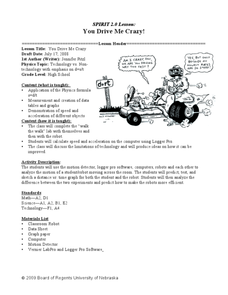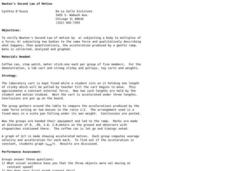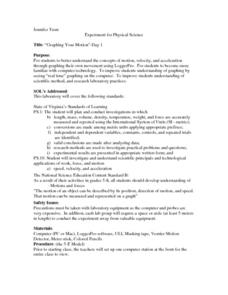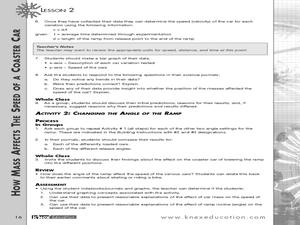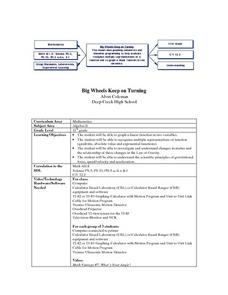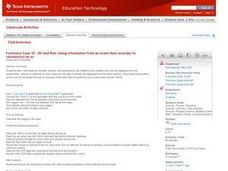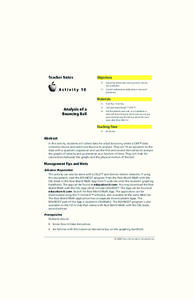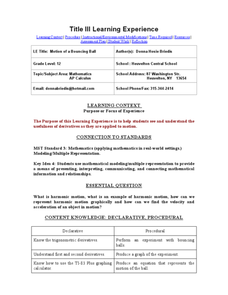Curated OER
Physics of Roller Coasters
Students design a roller coaster and demonstrate their knowledge of Potential and Kinetic Energy. They determine the average velocity a given marble travels on their roller coaster and apply their knowledge of various measurement systems...
National Council of Teachers of Mathematics
Varying Motion
For this secondary mathematics learning exercise, high schoolers collect data based on a person’s motion. From this data, students create graphs comparing displacement, velocity, and acceleration to time. The five-page learning exercise...
Flipped Math
Calculus AB/BC Unit 5 Review: Analytical Applications of Differentiation
Time to put it all together in one sheet—well five. Pupils review all the topics presented in the resources for Analytical Applications of Differentiation. The five pages summarize the concepts with explanations and examples.
Curated OER
You Drive Me crazy
Students calculate the distance and acceleration of an object. In this algebra lesson, students collect data and create table and graphs to analyze it. They complete a lab as they collect and analyze data on acceleration and distance.
Curated OER
Intro to 1D Kinematics with Physlets
Twelfth graders examine illustrations and animations on a Physlets CD in which they must describe motion, analyze graphs, and calculate initial velocity. The Physlet assists in providing active class participation in discussion.
NTTI
Vectors: Traveling, But in What Direction
High schoolers watch a video of real-world situations regarding speed, direction, velocity, force, etc. and answer questions while viewing. They then practice drawing and using vectors to solve more real-world problems.
Physics Classroom
Force and Motion
Scholars focus on associating balanced forces with at rest or constant velocity motion and unbalanced forces with acceleration or deceleration. Practice problems with immediate feedback allow for quick success in an installment of the...
Curated OER
Motion
In this motion worksheet, students complete graphs showing speed vs. time and acceleration vs. time. This worksheet has 2 graphs to complete.
Curated OER
Tracking Speed
Students collect data for a runner by measuring the time it takes for the runner to run equal distances. After collecting data, students average speeds and accelerations for the runner. Assignment is completed by graphing the data.
Curated OER
Newton's Second Law of Motion
Sixth graders study Newton's second law of motion and verify it. For this force and motion lesson students complete a lab activity and collect data, analyze it and graph it.
Curated OER
Motion
In this motion worksheet, learners determine the motion of a ball on different inclined planes, including the velocity and acceleration. This worksheet has 8 problems to solve.
Curated OER
Simple Harmonic Motion
Students solve problems involving graphs. In this calculus lesson, students relate harmonic motion to velocity. They discuss the derivative and the effect on the functions created.
Curated OER
Graphing Your Motion-Day 1
Ninth graders explore the concepts of motion, velocity and acceleration through graphing their own movement using LoggerPro. They become more familiar with the computer technology. Students explore graphing in real time and graph on...
Curated OER
I'm Inclined to See; Physics, Math, Science, Experiments, Graphs
Students discover the motion of a sphere on an inclined plane and discover basic relationships involving distance, time, speed(velocity), and acceleration.
Curated OER
Speed and Distance
In this speed worksheet, learners create time vs. distance graphs to answer questions about average speed, average velocity, and acceleration. This worksheet has 3 problems to solve.
Curated OER
How Mass Affects the Speed of a Coaster Car
Students determine what factors affect the speed of the car. In this physics lesson, students calculate speed, velocity and acceleration from experimental data. They construct and interpret motion graphs.
Curated OER
Worksheet 14
In this math worksheet, students analyze a path around a circle. The interval is defined. Students sketch a graph of a given parametric curve. Five application problems give students practice using these concepts in real life situations.
Curated OER
Big Wheels Keep on Turning
Eleventh graders work in groups and investigate how force determines the speed and distance then they view the video, "Math Vantage #7: What's Your Angle?." They are given a real life problem to solve using speed, ramps, angle, incline...
Curated OER
Rectilinear Motion
Twelfth graders rewrite word problems using algebraic expressions. In this calculus lesson plan, 12th graders calculate the velocity, time and acceleration while analyzing real life scenarios. They solve problems related to when the...
Curated OER
Hit and Run
Pupils explore data collection in this lesson. They investigate distance vs. time and velocity vs. time graphs using information collected with a CBR 2 to simulate the reconstruction of an accident.
Curated OER
IPC Physics Final Review
In this physics review worksheet, students compare experimental variable, simple machines, and Newton's Laws. Students calculate kinetic energy, work, power, speed, and velocity. Students review conduction, convection, and radiation....
MENSA Education & Research Foundation
Roller Coaster Mania!
Raise the energy level of your physical science class with this exciting hands-on activity. Applying their knowledge of kinetic and potential energy and Newton's laws of motion, young engineers use foam tubing and marbles to create...
Curated OER
Bouncing Ball Experiment
Students collect data for a bouncing ball and select one bounce to analyze. They explore the relationship between velocity, position and acceleration. They seek out connections between the graphs and the physical motion of the ball.
Curated OER
Motion of a Bouncing Ball
Twelfth graders complete a unit of lessons on derivatives as they are applied to motion. They observe and discuss demonstrations, conduct an experiment involving a motion sensor, graph and analyze the results, and summarize their findings.





